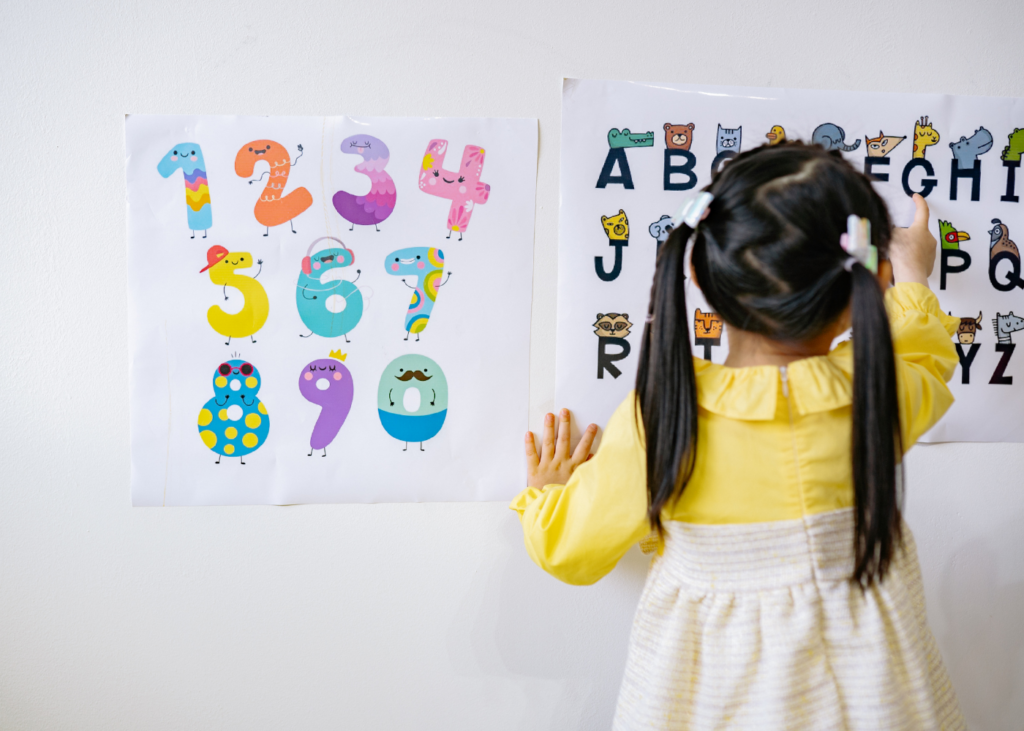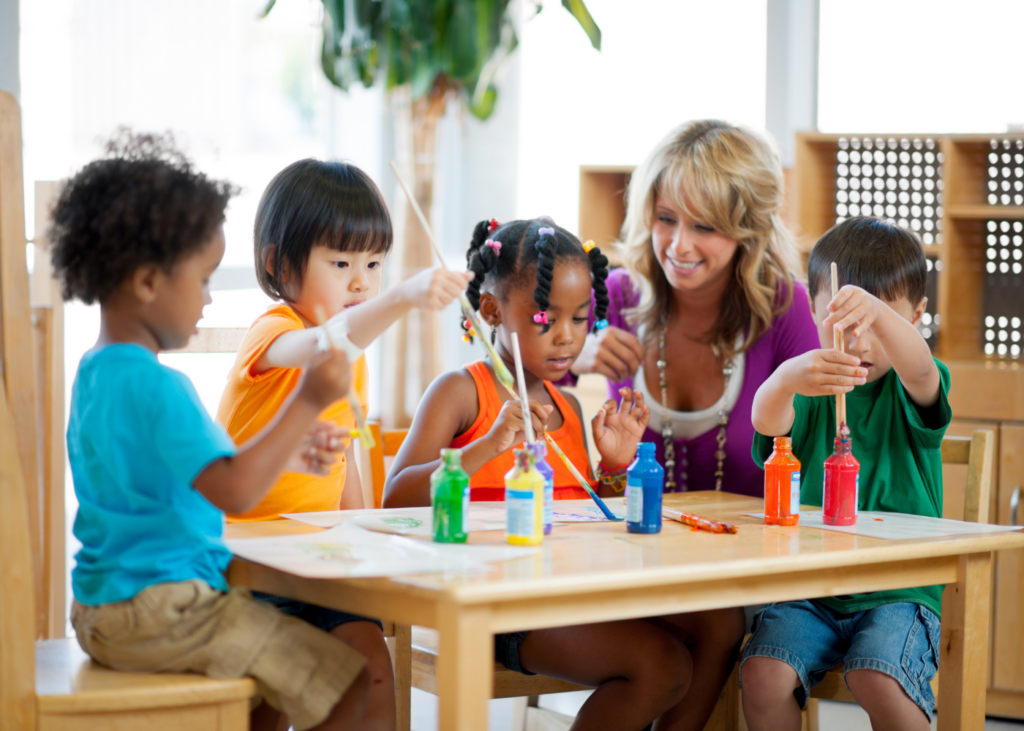When do kids start preschool? This is a question that many parents ask as their child gets closer to the age of 3. The answer to this big decision, however, depends on a variety of factors.
In this comprehensive guide, we will discuss when kids start preschool, what to look for in a preschool program, and how to choose the right one for your family!
P.S.: If you’ve already got one (or more) walkthroughs scheduled, check out this list of important questions to ask the teachers!
When do kids start preschool?
Pre-school a little different than daycare or childcare in general. This is an educational institution for children aged three to five years old.
Usually, toddlers begin preschool when they are 3 years of age. Ultimately, though, you will know when they are ready for preschool. They may be developmentally ready earlier than 3, so some teachers will allow them to enroll earlier than this age as long as they feel your child is ready for preschool.
The main aim of preschool is to prepare children for primary school and to prepare them for routines as they enter kindergarten. Most preschools follow the national, state, or provincial curriculums, which means they teach children the basic skills they need to be able to read and write.
Most preschools are run by Early Childhood Educators (ECEs) and teaching assistants. Pre-school can be full or part-time, and some parents choose to send their children to pre-school for just a few hours a week. It’s all about what works for you!

Benefits of a preschool program
The benefits of preschool extend far beyond academics. In fact, there are many benefits of pre-school, including the opportunity for social interaction with other kids and learn how to share and take turns. A preschool should be designed to provide a safe and nurturing environment where the children can play, explore, andlearn. Hopefully, their experience in preschool will help them develop a lifelong love of learning.
Preschool also helps your toddler to develop their fine motor skills, such as cutting with scissors and holding a pencil correctly. They may also get to take fun field trips!
If you are thinking of sending your child to pre-school, it is important to do some research beforehand. There are many different types of pre-schools, so it is important to find one that will suit your child’s needs.
For example, if your child has special abilities, you may want to find a preschool that has experience in supporting children with special needs. I definitely suggest chatting with the director to make sure that your child’s exceptionalities will be adequately accommodated during the program!
Preschools typically offer a variety of activities and experiences that help children develop cognitively, socially, and emotionally. In addition, some preschools offer specialized programs such as language immersion or an art-focused curriculum.
For all these reasons, preschool is an invaluable experience for any child. The benefits of preschool education are innumerable; it is truly one of the best investments you can make in your child’s future.
How to choose the right preschool for your child
Choosing the right preschool for your child can be a daunting task. There are many factors to consider and many schools available – Preschool is much more than just child care, after all!
In recent years, it’s become increasingly tough to get into preschool. This means you should start your search early and ask when preschools enroll children so that you can get into the school you want!
Above all, it is important to find a school that is the right fit for your child’s individual needs. With a little research and some knowledge of what to look for, you can find the perfect preschool for your child. Here are some things to keep in mind:
Understand your child’s needs
Ask yourself what you hope your child will gain from attending preschool.
Are you looking for a school that will provide a solid academic foundation? Or are you more interested in a program that emphasizes creative play and socialization? You may start narrowing down your selections once you have a strong idea of your child’s needs.
Another thing to consider is that many preschools require child is already potty trained. If they won’t be potty trained by that time, ask the preschool teacher for tips and make sure that they can accommodate this need so there are no potty accidents!
Take some time to research the different preschools in your area
Consult with other parents and check out internet reviews, and visit the schools in person if possible. If you can’t visit in person, suggest setting up a video conference to meet the teacher and view the space.
Pay attention to both the positive and negative aspects of each school. And don’t be afraid to ask questions – the staff should be happy to answer any questions you have about their program.
Trust your instincts
After doing all of your research, you should have a good feeling about which preschool is the right fit for your child. If something doesn’t feel right, it’s probably not the best place for your child. Trusting your instincts will help you make the best decision for your family.
What to expect on the first day of school

It’s natural to feel a little nervous on the first day of school. After all, it’s a new environment and you don’t know what to expect. But there’s no need to worry! Here are a few things you can expect on your first day of school:
Meet your teacher and classmates
Your teacher will probably introduce your kiddo to the class and tell everyone their name. Then, they will spend some time getting to know their classmates.
Learn about the classroom rules and expectations
Your teacher will go over the basic expectations with the kiddos, making sure that everyone is on the same page.
Start learning!
The first day of school is usually spent getting acquainted with the classroom and setting up for the rest of the year. The day will likely be filled with fun games and activities that help get the children acquainted with one another (and the teachers).
Don’t worry if everything seems a little overwhelming at first for yourself or your kiddo. You’ll settle into a routine soon enough! The first days can be tough, but hang in there – Once your little one realizes how much fun preschool is, they will be excited to go to school.
Common concerns parents have about preschool
Common concerns parents have about preschool are the environment, their child’s behavior, and the cost.
Concern: The environment
The environment of a preschool can be very chaotic and overwhelming for a child. Different activities are going on and there is usually a lot of noise. Parents worry that their children will not be able to focus or sit still in this type of environment.
Response: Yes, preschool classrooms are noisy. I’ve always felt that it’s better to have a noisy, happy, and productive classroom than a quiet space. Laughter and chatter mean children are enjoying their time and interacting with one another as they learn- That’s the goal!
If your little one is sensitive to noise or gets overwhelmed, chat with your teacher about what they suggest. Some classrooms will have a designated quiet corner for when children are overstimulated. Others may encourage the use of noise-canceling headphones.
Concern: Behaviour
Another concern parents have is their child’s behavior. Will their child listen to the teacher? Will their child follow the rules? Will their child be respectful to other children?
Response: This is likely your child’s first time in a school setting! Patience is key. Eventually, as they get used to the classroom routine, they will understand the role of the teacher and the classroom expectations. If there is a more serious behavioral concern, your teacher will likely request a meeting (or you can, too).
Concern: Cost
The last concern is the cost of preschool. Some parents feel that it is not worth the money to send their children to preschool when they could stay home with them. Other parents believe that the benefits of preschool outweigh the cost.
Response: Preschool can provide socialization, structure, and academic skills that are beneficial to a child’s development. Parents need to weigh the pros and cons of preschool before making a decision, of course, but I am biased as a teacher in saying that most times, preschool is the better option due to the vast benefits received by the child.
How to help your child adjust to preschool life
Starting preschool is a big milestone for both kids and parents! (Congrats!) It’s normal for children to feel separation anxiety about leaving the safety of home and their families and entering a new environment. When in school, preschoolers will have the qualified support of educated teachers to make sure your child receives the
There are a few things you can do as a parent to help your child adjust to preschool life:
- Take some time to visit the school together and meet the teachers. This will help your child feel more comfortable in the new setting. You can also talk about what to expect during the day, such as storytime, snack time, and outdoor play.
- Establish a daily routine leading up to preschool. Get your child used to waking up early and having a nutritious breakfast. Pack their backpack with everything they’ll need for the day, including a change of clothes if necessary. Even if it’s just spending a day at the park, getting used to being prepared to be away from home for a long period is important.
Also read: 10 Important questions to ask when choosing a preschool. This list of questions will help you feel prepared for your conversation with the preschool teacher.
Getting ready for Kindie? Read: Kindergarten readiness: Preparing for their first year


Leave a Reply